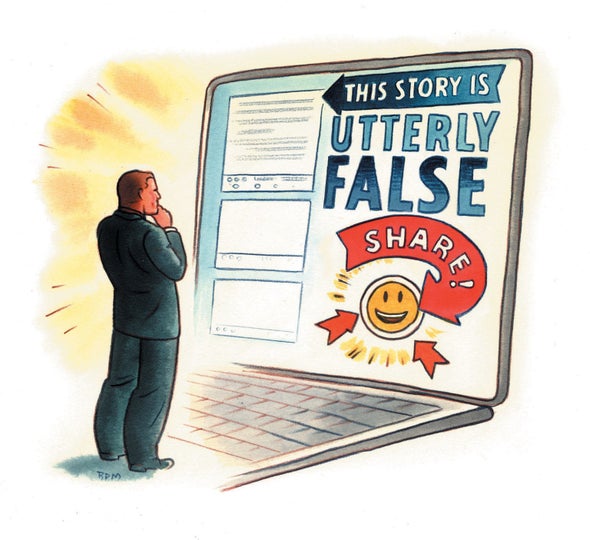Behavioral and political scientists have pointed fingers at political conservatives, as opposed to liberals, when it comes to spreading fake news stories. But not all conservatives do it, and sweeping generalizations threaten to condemn everyone who subscribes to conservative values. This approach risks even more dangerous polarization.
Political leanings are far from the only determinants of behavior. Personality is a crucial influence, so our research on misinformation sharing has focused on that. One widely used psychological system for identifying personality traits organizes them into five categories: openness to experience, conscientiousness, extroversion, agreeableness and neuroticism. (It is called, unsurprisingly, the five-factor theory.) We looked specifically at conscientiousness, which captures differences in people’s orderliness, impulse control, conventionality and reliability.
In a series of eight studies with a total of 4,642 participants, we examined whether low-conscientiousness conservatives (LCCs) disseminate more misinformation than other conservatives or low-conscientiousness liberals. First we determined people’s political ideology and conscientiousness through assessments that asked participants about their values and behaviors. We then showed the same people a series of real and fake news stories relating to COVID and asked them to rate how accurate the stories were. We also asked whether they would consider sharing each story.
Both liberals and conservatives sometimes saw false stories as accurate. This error was likely driven in part by their wanting certain stories to be true because they aligned with their beliefs.
But actually sharing false news was markedly higher among LCCs compared with everyone else in the study, although some people of all persuasions did it. There was no difference between liberals and conservatives with high levels of conscientiousness. Low-conscientiousness liberals did not share more misinformation than their high-conscientiousness liberal counterparts.
What explains the exceptional tendency of LCCs to share fake news? To explore this question, we gathered information about participants’ politics and personalities and administered questionnaires to assess their need for chaos—the desire to disrupt and destroy the existing political and social institutions—as well as their support of conservative issues, support for Donald Trump, trust in mainstream media and time spent on social media. LCCs, we learned, expressed a general desire for chaos, and this need may explain their proclivity to spread misinformation. Other factors, including support for Trump, were not as strongly related.
Unfortunately, our work on this personality trait also suggests that accuracy labels on news stories will not solve the problem of misinformation. We ran a study where we explicitly stated whether each news story in question was false, using a “disputed” tag commonly seen on social media, or true, using a “supported” tag. We found that the supported tag increased the rate at which real stories were shared among both liberals and conservatives. LCCs, however, continued to share misinformation at a greater rate despite the clear warnings that the stories were false.
We ran another study that involved explicitly telling participants that an article they wanted to share was inaccurate. People then had the chance to change their choice. Not only did LCCs still share fake news at a higher rate than others in the study, but they also were comparatively insensitive to direct warnings that the stories they wanted to share were false.
The poor effectiveness of warnings among LCCs is worrying because our research suggests these people are primary drivers of fake-news proliferation. Social media networks therefore need to find a different solution than just tagging stories with warning labels. Interventions based on the assumption that truth matters to readers may be inadequate. Another option might involve social media companies monitoring fake news that has the potential to hurt others, such as misinformation related to vaccines and elections, and actively removing such content from their platforms.
Whatever the case, until these companies find an approach that works, this problem will persist. In the interim, our society will pay the cost of spreading misinformation. The long, conspiratorial road that rioters followed to the January 2021 Capitol insurrection shows that this spread can have serious and damaging consequences.



